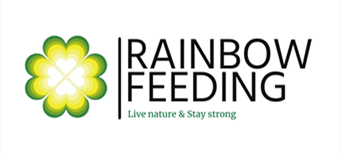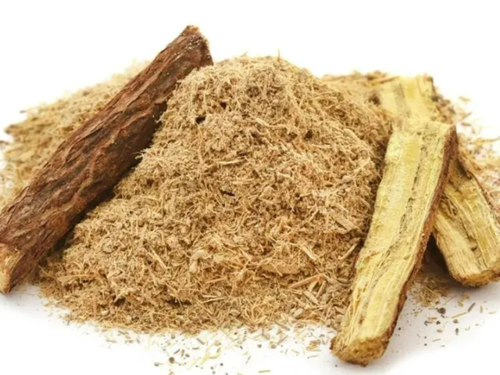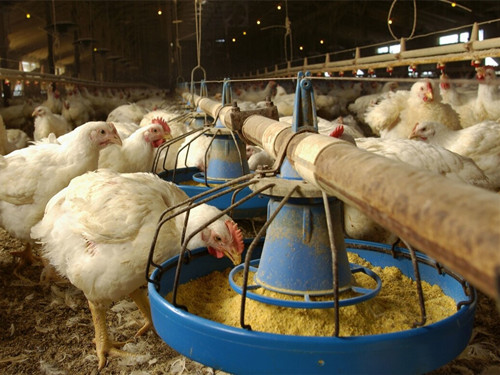Licorice Root Extract For Poultry Diet
Herbs are popular for their benefits to animals, birds and humans. Feed additives and nutritional supplements such as prebiotics, plant extracts and probiotics are widely used in poultry diets because they promote growth, production and health of poultry. Licorice extract is used in medicine, as a flavoring agent and food preservative in the food industry, and in other cosmetics. Chemical analysis showed that the main components of the extract were triterpenoid saponins (such as glycyrrhizin, glycyrrhetinic acid, glycyrrhizic acid, etc.), flavonoids (glycyrrhein, isoflavone, formononetin, etc.), sugars, starches, amino acids, ascorbic acid, tannins, choline, coumarin, phytosterols and some picrin. Currently, glycyrrhiza extract has been found to have a variety of pharmacological effects on humans and animals, such as immune regulation, antibacterial, antioxidant, anti-inflammatory, anti-diabetes, liver protection, antiviral, anti-infection and free radical scavenging. In this paper, the application of licorice extract, as a feed additive in poultry diet was introduced, which provided a reference for the growth performance, immunity, antioxidant and safety of poultry.
Specific applications studied in poultry include:
Enhance immunity:
Flavonoids, glycyrrhiza, triterpenoids and saponins were the active substances of glycyrrhiza root extract with antioxidant and anti-inflammatory functions. It can be used for a variety of conditions such as oral ulcer, arthritis, anti-inflammatory drugs, immune regulators, detoxification, anti-cancer, anti-aging, anti-oxidation, antibacterial and growth promotion. Its action mechanism is mainly as follows:
1) Inhibit lipid peroxidation in mitochondria, reduce oxidation rate and the formation of thiobarbituric acid reactants;
2) scavenging free radicals;
3) Improve the activity of oxidase;
4) Inhibit the activity of phospholipase A2 (a key enzyme in inflammation);
5) Glycyrrhein A inhibited LPS-induced inflammation by inhibiting NF-κB and p38/ERK MAPK signaling pathways;
6) Glycyrrhizin A can prevent cell oxidation;
7) Flavonoids may inhibit the secretion of inflammatory cytokines by acting on NF-κB signaling pathway;
8) Glycyrrhizic acid, glycyrrhiza and glycyrrhiza can reduce the expression of liver pro-inflammatory cytokines (IL-1β, IL-6 and TNF-α) and block various inflammatory mediators produced by activated macrophages;
9) Glycyrrhizic acid can directly inhibit the formation of prostaglandin E2 and the activity of epoxide, and indirectly inhibit platelet aggregation and secretion of inflammatory factors. But studies have found that glycyrrhetinic acid may delay the release of cortisol, leading to high levels of oxidation in hens and increased heart weight. Therefore, while evaluating the antioxidant and anti-inflammatory functions of glycyrrhiza root extract on poultry, its safety should also be considered.
It has been found that natural plant feed additives can also be used as immune enhancers, which can increase the body’s white blood cell count and interferon levels. Licorice root extract also improves immune response in birds. Fifty-four commercial broilers were randomly divided into three groups. The control group was fed a basal diet, and the other two groups were fed with 1% glycyrrhiza crude extract powder and 0.1% glycyrrhiza glabra extract powder, respectively. The results showed that 0.1% glycyrrhiza glabra extract powder significantly improved the immune response of broilers. Supplementation of licorice extract (50 µg/mL) in laying hens’ diets improved cellular immunity and increased the phagocytosis of avian monocytes and granulocytes (Dorhoi et al.).
Antiviral:
Glycyrrhetinic acid has been found to have a variety of pharmacological effects, such as immune regulation, promoting interleukin, antibody, interferon, and T cell synthesis (antiviral). Therefore, licorice extract can improve humoral immunity and cellular immunity of poultry, and can also be used to prevent and treat viral diseases. Adding glycyrrhiza extract in the diet can increase the weight of the immune organs such as spleen and bursa of Fabricius, improve immune efficiency and health status of broilers. The saponins in Glycyrrhiza glorrhiza can bind with Eimeria coccidioides antigen, play the role of immune stimulation, improve the antibody titer in poultry blood, and help poultry to resist coccidioides infection.
Omer et al. reported that licorice extract (60mg/100ml) was resistant to Newcastle disease virus. Adding 60µg /mL glycyrrhizic acid in drinking water can increase the level of Newcastle disease virus antibody and the number of lymphocytes and platelets in blood of broilers, that is, improve the cellular immune response of broilers. 300 µg/mL Glycyrrhiza glabra extract significantly reduced the survival rate of Newcastle disease virus-infected chick embryos, and the detection of Newcastle disease virus in allantoic fluid was negative.
Dziewulska et al. reported that 10% glycyrrhiza extract could reduce the RNA amount of paramyxovirus type 1 (PPMV-1) in kidney and liver of pigeons, indicating that glycyrrhiza extract has antiviral function. When injected with 300 or 500mg/kg of aqueous glycyrrhiza extract for 7 consecutive days, the expression of IFN-γ gene was increased in the pigeons infected with PPMV-1. The expression of CD3 gene in the pigeons was the lowest on the 7th day of injection, and the expression of CD3 gene was the highest in the uninfected group and the lowest in the infected group. Supplementation of aflatoxin-contaminated diets with 150, 300, and 450mg/kg licorice in broilers significantly improved the negative effects of the toxin on most carcass characteristics (Al — Daraji et al.). But it’s worth looking into further.
As a natural plant extract, glycyrrhizic acid has almost no side effects, and its function is similar to that of aesculus chinensis, Gypsophila and Quil-A saponins. Glycyrrhizin can be used as an efficient and safe immune adjuvant and an effective antigen transmitter in vaccine development. Although many studies have confirmed that glycyrrhiza extract has immune regulation and antiviral effects on poultry, more studies are needed on the optimal dosage, mechanism of action and economic value of glycyrrhiza extract.
Reference:
Enas Tosona, Maha Abd El Latif et al..(2022) “Efficacy of licorice extract on the growth performance, carcass characteristics, blood indices and antioxidants capacity in broilers




